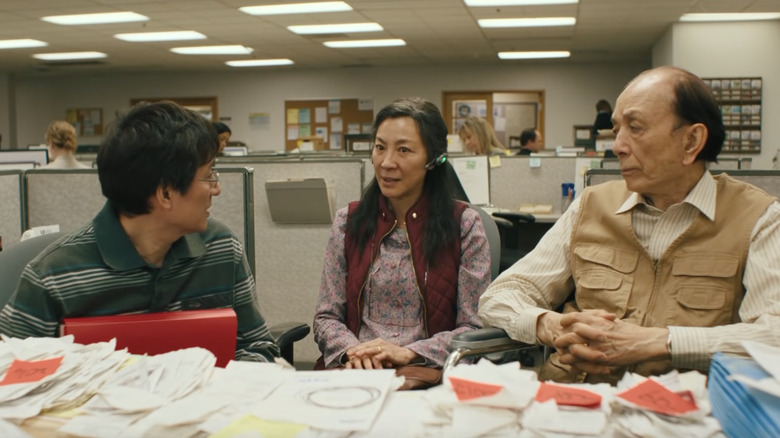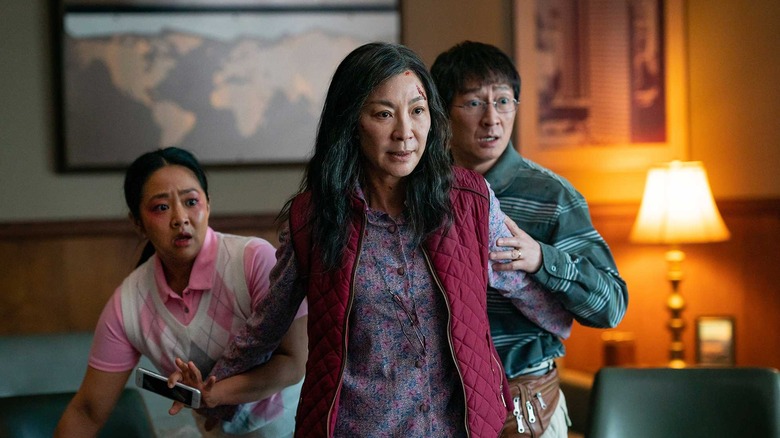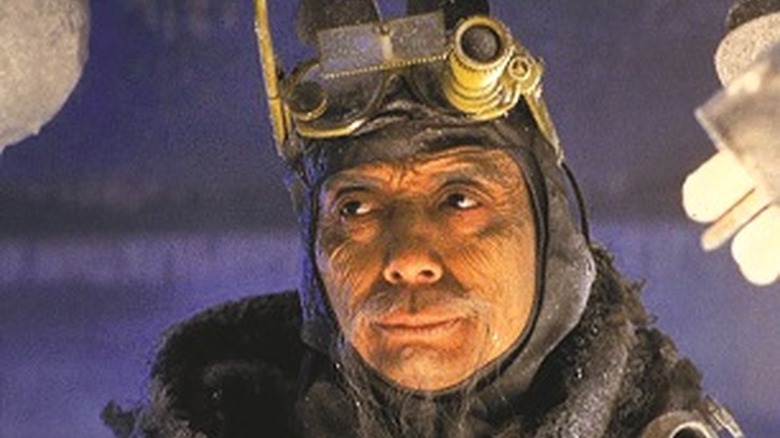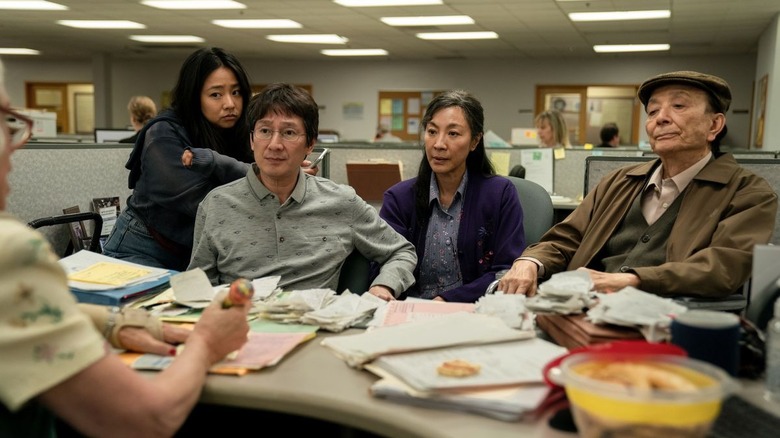Everything Everywhere All At Once Actor James Hong On Being A 93-Year-Old Action Star [Interview]
You probably recognize his face, or at least know his voice from the hundreds of movies, TV shows, video games, animated movies that he's appeared in. In fact, James Hong might be the most prolific actor many people don't know the name of.
Appearing in over 500 films and TV shows, Hong has been steadily working since the 1950s and has worked alongside the greats like Gene Wilder, under the great filmmakers like Ridley Scott, and has voiced every other Asian character you probably grew up with — Mr. Ping in the Kung Fu Panda franchise, Daolon Wong on "Jackie Chan Adventures," or Chi-Fu in Disney's 1998 animated movie "Mulan." And at 93 years old, he's busier than ever, following up a recent turn in Pixar's "Turning Red" with what is perhaps the strangest, most out-there performance of his life in "Everything Everywhere All At Once."
"It's never been done before that I know of," Hong told me in an interview over Zoom ahead of the release of "Everything Everywhere All At Once." "It certainly is a different film from the other films that I have done."
In Daniels' "Everything Everywhere All At Once," Hong plays a character that isn't too far outside his wheelhouse: the cantankerous Chinese-speaking father of Michelle Yeoh's beleaguered laundromat owner, Gong Gong. But he also plays an alternate universe version of himself who wields dual guns and throws himself into battle against the forces of evil. It's wild, but kind of a perfect role for Hong, who got his start playing bit roles as supporting (often stereotypical) Asian characters and who helped found a martial arts school in Los Angeles.
"Through our efforts and through the efforts of the films having to do with martial arts, now [kung fu] has become very prominent," Hong said.
I chatted with Hong about "Everything Everywhere All At Once," fighting out of a wheelchair, and his thoughts on being part of a new wave of Asian-led movies.
'I go to work every day and I wonder what's going to be next.'
You are one of the most prolific working actors today with over 500 credits to your name. How does "Everything Everywhere All At Once" compare to the rest of your filmography?
It certainly is the most different, I think of all the films I have done up to today, or one of the most. And it's the strangest. The premise is very different in expression of the plot. It's very different. It's a sort of a young, new wave of expressing yourself nowadays. Things have to be different, and expression has to be new and fresh. That's this film. It's never been done before that I know of. It certainly is a different film from the other films that I have done.
So this movie is so rapid fire and fast paced, was there ever a moment that you felt lost or like you didn't know where your character was?
Definitely. In fact, I go to work every day and I wonder what's going to be next. I really don't know what's coming up. And then I talk it over with the directors. They're very cooperative and easy to work with. And after listening to them, I do the best I can. The two of them buzzing with each other, and they work very well together. And then they come up with some suggestion for me, as far as the direction that I should move, as far as to help the scene. That's the way it's been throughout the movie. It's never been any different. There's no conflict.
It is great to be working with directors that wants to cooperate and communicate. They don't lord themselves over you as being, "I'm the director." Like in the old days when Henry King and these people that directed big movies. The other one, I forgot what his name was, but in the old days, they thought they were king, and they were king. You couldn't say a thing. And even "The World's Greatest Lover," who was in that? Gene Wilder, as the director. It's very much to themselves, and they don't really want you to say anything. You just do your job. But that's not the way it was with this movie, "Everything Everywhere All At Once." You can contribute as much as you want to, and whether they'll use it or not is another question, but you go ahead and contribute, so I felt very good about that.
I heard from the directors, Daniels, that you made one request to the script, which was that Gong Gong not sleep so much. What did Gong Gong's original role look like, and what made you want to change that aspect?
Oh, well, I did mostly what the script said Gong Gong would do. And by the way, the [fact that Daniels used] "Gong Gong" is very good. It's [means] Chinese grandfather. And we use that term here in my family. Susan calls, or my daughter calls her grandfather Gong Gong, so it's a very authentic expression. And as far as doing what the character is supposed to be doing, I'm pretty much in tune what kind of person Gong Gong is, because I'm pretty dominant as a person in a sense of expressing myself. Although, I like to think of every aspect of the situation or it's a thought. I try to be not prejudiced, but think of the point of view of the other person. Gong Gong probably doesn't give that thought to much of his character, in the sense that he is pretty much dominating. He thinks he is the right person almost all the time.
'I'm still capable of moving at this age.'
You get to perform action and even some battle sequences in this film. Did you imagine doing this at this stage in your career? And what was that like?
Oh, no, no, I'm still very active. That wheelchair is just a prop, as far as I'm concerned. In my own movie, "Patsy Lee & The Keepers of the 5 Kingdoms Film," my own production, I do a lot of action. So I'm still capable of moving at this age.
I, more or less, started that trend in movies in the sense that I helped my master ... formulate the first martial arts school in Los Angeles. That's how early it was, way back. And we rented a little space next to the Bank of America, I believe on Hollywood Boulevard and Western. It was the first school. It wasn't popular in those days, but through our efforts and through the efforts of the films having to do with martial arts, now this exercise has become very prominent. I would venture to say there's probably 30,000 kung fu schools in the greater Los Angeles.
I feel like this film deals a lot more with the Asian diaspora experience than I anticipated. It's about the rift between family members and also the coming to a certain kind of peace with each other. And I think that's something that only Asian immigrant and second generation Asian immigrant filmmakers and creators can really kind of hone in on. With the surge of films like "Turning Red," as well, which you're also in, and also "After Yang" and "Minari" that really tackled a specific part of this Asian American, Asian diaspora experience, do you think "Everything Everywhere All At Once" is part of that wave?
Oh, definitely. I think this, "Everything Everywhere All At Once" is part of a movement of the Asian expression coming forward. Because let's say 20 years ago, well, 10 years ago even, but certainly 20 years ago, there were no films expressing our feelings. But now it's coming out in this film and this prominent director who won the Academy Award, they expressed it in another way. But it's a universal feeling, and that's the way it should be. We all should express ourselves the way we feel. And if it comes out having a flavor of Asian Americans, that's fine, but that's what's coming forward now.
Thankfully, there are Asian artists in every field, whether it's directors, producers like Daniel Dae Kim. He's a very prominent producer, actor, multi-talented person. And I think that's the future of the Asian Americans in this industry. If they're going to, the prominent talented people will come forth and do their own thing and make a mark in this industry. I'm sure of that. It's happening right now, so hopefully it grows even faster, and that the community and industry pay attention and help this movement of universal expression.
'I become a much more powerful human being or spirit that wants to do much more than just being in a tiny little laundry.'
Speaking of Asian American universal expression, your character, Gong Gong, you play different versions of him. One from the ordinary world, one from the dystopian science fiction world, but his motivations in both worlds will boil down to his complicated relationship with his daughter, Evelyn, played by Michelle Yeoh. Can you speak to these relationships and how these big sci-fi concepts in this movie help break down those relationships?
Well, as Gong Gong the grandfather, of course, he stays within his realms in his role as the grandfather, very so-called in a bracket. He is the typical old grandfather in a movie. So however, when I go into the other part of the multiverse, I become a much more powerful human being or spirit that wants to do much more than just being in a tiny little laundry. So in that sense, it's a multifaceted character, and he is the driving force when he becomes that so-called powerful figure. He wants to turn things around and use [Evelyn] to help him in that aspect. So it becomes a different character, becomes a different film.
In the film, you get to play, in a sense, the antagonist. You kind of turn against the main characters towards the end. So what would you say motivated your character's turn like that?
Well, the powerful Gong Gong at the end doesn't want any part of that benign human being in the other world. He wants to be, as a lot of us want to be, more powerful, to be able to do more things. That's the spirit of that particular Gong Gong at the end. He wants to be the top man. He doesn't want to be the underling. He thinks that the Gong Gong in the other world is nothing. He wants to be a much more important person. And that's why he drives the movie and [Evelyn] to a different level. But of course, it doesn't quite work out, but that's what he wants.
There are so many things happening, and so many different readings of "Everything Everywhere All At Once." But what would you say your takeaway is from the film in a handful of sentences?
Okay. My takeaway from this film and doing this film is that it was a lot of fun to be in possibly the craziest film I've ever been a part of, that I ever participated in. It's a fun film, and it gave me a chance to work with people who want to contribute. Nobody is superior in this film. Everybody work as a member of the team, and I think it shows in this movie. It's one wholeness in the sense of many pieces. That's the great thing about working in this film.
"Everything Everywhere All At Once" opens in theaters on March 25, 2022.



